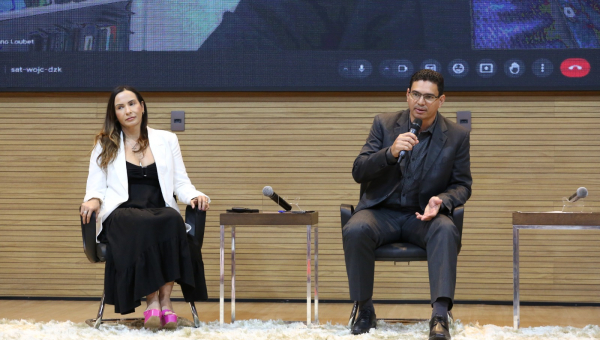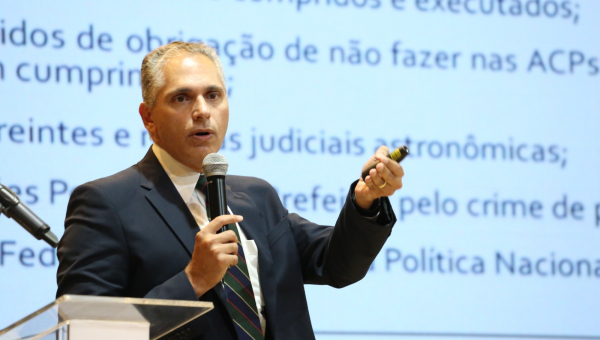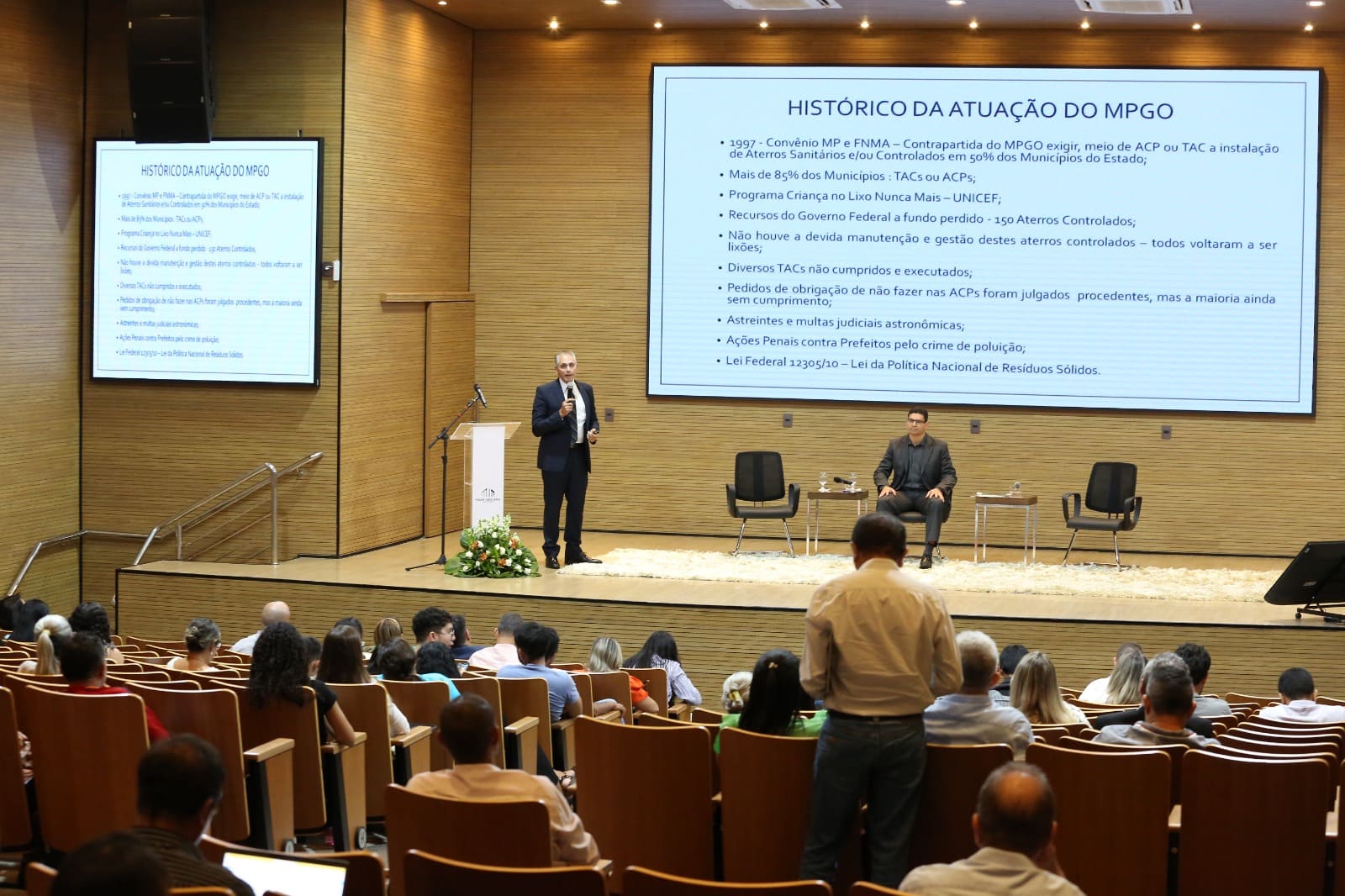
A balance of the actions of control bodies, public administrations and the sector to find definitive solutions for the treatment of solid waste in the states of Goiás, Mato Grosso do Sul and Tocantins guided the panel on "Integrated Solid Waste Management with a focus on the closure of landfill sites" on Friday afternoon (14/6), in the last discussion block of the IV Seminar on Socio-Environmental Management with the theme "Networking for Zero Landfill in Tocantins", held by the Tocantins Judiciary.
The keynote of the explanations of the guests can be summed up as the need to seek understanding among managers, the private sector and control bodies in order to create incentive mechanisms for solutions such as transshipment and reverse logistics, when the collected waste undergoes treatment and is recycled as a raw material for the production process.
Juliano de Barros Araújo, a Prosecutor at the State Prosecution of the State of Goiás, highlighted the ministerial action, which has ceased to be judicial and litigious, in order to seek alternatives to eliminate dumps and implement proper treatment. One of the ways out pointed out by the Prosecutor is the temporary or permanent contracting of private landfills, which is already a reality in the neighboring State, with three units close to the Federal District.
For the speaker, it is necessary to think of an incentive mechanism for companies to expand their facilities in a more agile way. "A private landfill in the State of Goiás takes 12 years to be licensed. If it were a polluting industry, it would be licensed in three months, but a landfill that treats the pollution of the entire population takes 12 to be licensed. It's unbelievable. And you're hearing this from the State Prosecution," he said at the opening of the panel.
He also mentioned state project initiatives that provide municipalities with a sorting center, a transshipment center (which receives and concentrates smaller loads of waste into larger vehicles to be taken to the final destination) and an incubation project for waste pickers to train themselves to form formalized cooperatives and buy equipment to carry out selective collection.
Recycling credits and valuation of the waste pickers
From the experience of the State of Mato Grosso Sul, the other speaker in the afternoon, Luciano Furtado Loubet, a Public Prosecutor, showed the strategic change in action to interrupt the cycle of legal actions and start dialoguing with public managers to implement adequate landfills. "The reality today is that 94% of the municipalities have adequate landfills and with the municipalities that transfer to landfills, whether private landfills or public landfills, today there are few municipalities that still have any individual sanitary support."
The Prosecutor also pointed to reverse logistics as a way out. From Mato Grosso do Sul, a State with strong agricultural production, the panelist highlighted reverse logistics. He mentioned packaging that is generally found in every home, such as soap powder boxes, aluminum cans and beer bottles.
"Here, in the municipalities, we're doing our job, which is reverse logistics for packaging in general from industry, but what we're seeing in Brazil is that there was no effective policy for this," he noted, recalling that the State has become a national reference with a program that instituted recycling credits.
According to the Prosecutor, the legislation requires that "industry has to structure reverse logistics systems independently of the public service" in order to make reverse logistics and its financial return viable. The Prosecutor emphasized the importance of the resource to give financial sustainability to the waste pickers, who he considered to be important environmental agents.
Environmental transparency and legal security
At the end of the panel, of which he was the mediator, the coordinator of the Operational Support Center for Housing, Urban Planning and the Environment (Caoma) of the State Prosecution, Prosecutor Francisco Brantes, stressed the need for legal measures to give legal certainty to companies that undertake private landfills, among others. "The companies are prepared, but what do they need? Legal certainty, a commitment to permanent inspection, effective management by both the state and municipal authorities," said the Prosecutor, arguing that this is a minimum set for the entire reverse logistics chain to work in the State of Tocantins.
He also highlighted several joint measures with public agents and the private sector as a step forward in the search for ending the landfill in the State, and ended his participation with a presentation of the "Environmental Radar", a data aggregation tool developed by the agency.
The Prosecutor defended environmental transparency as a mechanism for monitoring solid waste treatment policies and highlighted three panels developed by the agency, which monitor deforestation, fires and the solid waste situation in real time in all 139 municipalities. The panel can be accessed here.




_thumbnail_thumbnail.jpeg)
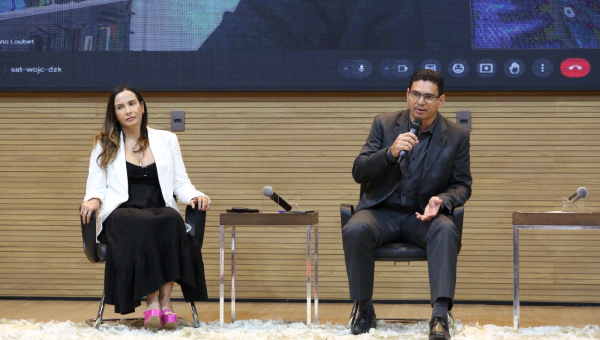
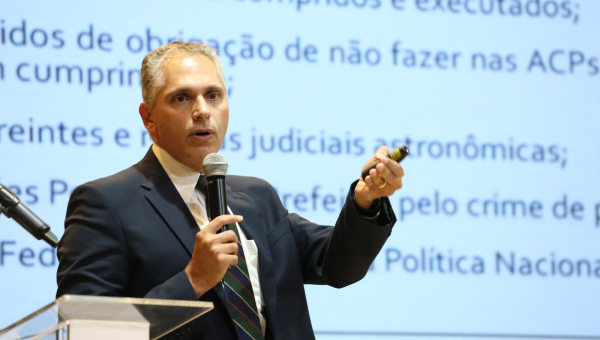
_thumbnail.jpeg)
